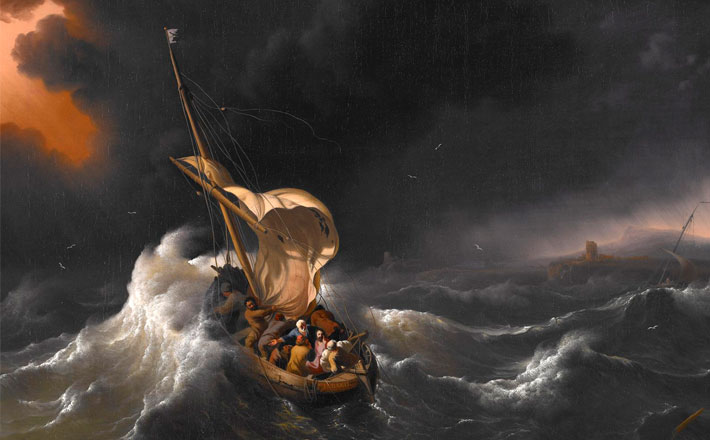Commentary on Job 38:1-11
God’s speech from the whirlwind to Job has been a long time coming.
Readers of the book know that Job’s celebrated patience in suffering came to a crashing halt at the end of the second chapter. Beginning with chapter three, and with increasingly acerbic force throughout the book, Job challenged the LORD to give an account not only for his sufferings but for the injustice he saw in every corner of the creation.
The wisdom tradition declared the world’s construction to be a result of a blueprint drawn by the LORD (Proverbs 3:19-20; 8:22-31). Job concluded, to the contrary, that an unjust and irrational world belied any wisdom or careful planning on the part of God (Job 12:13-22).
Indeed, in a blistering description that could easily have been cribbed from a modern newspaper,1 Job insisted that in this world the wicked succeed, the innocent suffer, “the dying groan, and the throat of the wounded cries for help; yet God pays no attention to their prayer” (Job 24:12). Job counted himself among those last, as one whom God had not heeded. Worse, he knew himself to be someone to whom God did not listen and whom God crushed without cause:
“If I summoned him and he answered me,
I do not believe that he would listen to my voice.
For he crushes me with a tempest (se’ara) ,
and multiplies my wounds without cause;” (Job 9:16-17)
It is fitting, therefore, that the LORD answers from a whirlwind (hasse ‘ara). In the Bible, the whirlwind is often a theophanic sign.2 In other places, however, the whirlwind signals the judgment of God,3 a symbol also familiar to Job’s readers. Which is it here? Perhaps we do not have to choose. The LORD appears, albeit cloaked in storm, in order to respond to Job. The LORD has listened to Job’s voice after all. Nevertheless, this same LORD comes, if not with a crushing tempest, if not with an annihilating judgment, then at least with a pronounced disapproval of Job’s degraded relationship with the LORD. Job has become one “that darkens counsel by words without knowledge” (v. 2).
Where had Job gone wrong? The entire biblical lament tradition indicates that ancient Israelites had no problem questioning God’s behavior with respect themselves or complaining about God’s treatment of them. In Job’s case, however, it may be that a subtle shift has moved Job from being a man who maintains his integrity in spite of his afflictions (Job 2:3,9) to one who has come to believe that his integrity, identified with his good deeds, ought to have shielded him against affliction: “let me be weighed in a just balance, and let God know my integrity! (Job 31:6).4
Shortly before Job ended the conversation with his three friends, he expressed his conviction of the utter justice of his complaint. He boasted that if he had a written indictment by God, (his adversary!), he would wear it like a crown and approach the Almighty like a prince (Job 31:35-37). Then, for a time at least, “The words of Job are ended” (Job 31:40b).
The LORD responds not by evaluating the merits of Job’s case, but rather by questioning Job’s knowledge of the mysteries and purposes of God. The appointed text is a portion of two divine speeches (Job 38:2-39:30 and 40:6-41:34). Both speeches are characterized by a barrage of rhetorical questions designed to fully disclose Job’s inadequate understanding of God’s governance of the world.
In the first speech, the LORD specifically challenges Job’s understanding of the architecture of the cosmos (vv. 4-38) as well as the divine care of the creation, illustrated by the LORD’s intimate knowledge of five pairs of untamed animals (38:39-39:30). Verses 4 to 7 reflect the pride of the divine architect who alone knows where and how the foundations of the earth were laid or the true scope of the creation. Images of meticulous planning, measuring, and careful construction counter Job’s earlier derision of God’s counsel. To the contrary, the creation is God’s own temple, the dedication of which was liturgically celebrated by the singing morning stars and the shouts of heavenly beings (v. 7).5
Verses 8 through 11 speak of God’s control of the tempestuous and chaotic sea. Oddly, however, where we might expect an image of the sea as a chaos monster slated for destruction by the divine warrior,6 we find instead a picture of God as midwife and of the sea as a newborn child, bursting from the womb (v. 8). Lest the sea hurt itself and others, God swaddled the child (v. 9) and set limits for this most boisterous infant (vv. 10-11).7
How talk of cosmic architecture or even of God’s care for the sea serve as a proper response to Job is, of course, the question, and one that the preacher must try to answer. Congregants experience suffering in greater or lesser measure and those who suffer deeply, painfully, and without any apparent fault of their own, find pious platitudes no more palatable than did Job his counselors’ consolation.
The present writer can do no better than to point to the wisdom of his former teacher and mentor, the late Daniel Simundson.8 Discussing the message of the speeches of God, Simundson observed, first, that the speech illuminates the unbridgeable gap between divine and human knowledge. While we may dislike our inability to penetrate the mysteries of God, at some point we are better off if we accept the reality of our human limitations. Second, Simundson asserts that a relationship of trust with God is more important than answers to our question of “Why?” Even if he knew the answers to his questions, Job would not be satisfied with an intellectual solution. Job’s deeper need was to know that God had not abandoned him, that God still cared for him. What most suffers need, Simundson writes, “is a visit from God.”9
Such a visitation is, of course, exactly what we have in Christ Jesus and his cross. More than that, the cross of Christ is a divine participation in every aspect of our humanity, including our suffering.10 We may not see answers for suffering, “but we do see Jesus … now crowned with glory and honor because of the suffering of death, so that by the grace of God he might taste death for everyone” (Hebrews 2:9).
We see Jesus and, seeing him, it is enough.
Notes:
1 See the whole of Job 24:1-25.
2 2 Kgs 2:1, 11; Ezek 1:4; Zech 9:14.
3 Isa 40:24; 41:16; Jer 23:19; 30:24; Ezek 13:11,13.
4 See Job 31 that constitutes Job’s litany of his righteous deeds of omission and commission that comprise his final word.
5 Carol A. Newsom, Job, in The New Interpreter’s Bible, vol. IV (Nashville: Abingdon, 1996) 601-2. Newsom notes that the laying of temple foundations were liturgical occasions that involved musicians, singers, and festal shouts (see Ezra 3:10-11; Zech 4:7; cf. 2 Chron 5:11-14). When the LORD laid the foundations of the world (the LORD’s temple), heavenly beings performed those functions.
6 E.g., P 74:13-15; 89:9-10; Isa 51:9-10.
7 Carol A. Newsome, Job, p. 602.
8 Daniel J. Simundson, The Message of Job: A Theological Commentary (Minneapolis: Augsburg, 1986), 150-1.
9 Ibid, 151.
10 Heb 2:17-18.


June 21, 2015